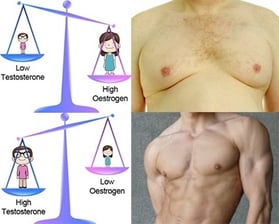We often think of the devilish culprits disrupting our goals of fat loss and having a better physique coming in the form of frosted cookies or an extra jelly donut. Well Captain Obvious, knowing that is easy as pie. But what if one of the major contributing problems is naked to the eye and more on a microscopic level?
For those that have short attention spans, you can jump right to any parts you feel is relavent to you below by clicking a link:
Although we don’t see our hormones, they are always contributing to critical functions going on in our bodies. Or in some cases where they are absent or lacking, not. Hormones are chemical messengers always traveling around in our circulatory systems to all our organs and tissues throughout the body. They have a big influence on energy levels, metabolic state, fat storage, fat burning, sex drive, cognitive performance and many more important functions.
In efforts to look and feel our best, we typically focus a lot on exercise and diet, as we should. But deeper important players underneath such as hormones, have a HUGE say in whether you’re going to feel your best or have that six-pack popping when you take your shirt off next summer.
To help you understand and get a grasp on your health and fitness goals, we are outlining five of the most important hormones to encourage you to have optimized for best your results.
#1 Hormone: Testosterone
We all know of testosterone being the male dominant hormone. But, females need this as well and in their ovaries, produce some in much smaller doses. Testosterone can be traced to having positive impacts on not just muscle but also energy, brain and even heart health when at the right levels.
So, how do you optimize your levels of testosterone? For starters and as with most hormones, practicing healthy lifestyle factors such as proper eating habits, getting a good night’s sleep every day and engaging in regular exercise go a long way. More intense workouts have been shown to have a positive impact on testosterone levels. However, sometimes with aging, environment and/or genetic factors, some men may suspect their levels are prematurely too low. You can learn more about testosterone, the benefits of having optimized levels, why it declines and more at the links below:
• Testosterone prevents heart problems:
• What causes testosterone to decline:
• Should I start TRT (testosterone replacement therapy):
#2 Hormone: Growth Hormone
The quest for the best fat loss solutions seems to be tough for many. The search for the effective “tools” to help in the journey can be even harder. For those well informed and capable, human growth hormone (HGH) is arguably the hands down, best key player in helping win the fat loss battle when combined with proper diet according to some studies. But that’s not all, HGH is very well known to support muscle, connective tissue, better sleep and so much more as well.
What is HGH?
Growth hormone is a peptide hormone that stimulates growth, cell reproduction, and cell regeneration in humans and other animals. HGH is produced in the pituitary gland up in our brain which triggers growth in children and into their teenage years. In addition, it helps to regulate muscle to fat ratio, muscle and bone growth, sugar and fat metabolism, body fluids, and some experts even believe heart function. HGH works by stimulating the liver and other tissues to make insulin-like growth factor 1 (IGF-1), which is essentially the “end-product” that gives us many of the known benefits mentioned.
Supporting our aging bodies production and levels of growth hormone can be supported by also, getting quality sleep and intense workouts in. Tabata training as well as High-Intensity Interval Training (aka; HIIT) are known to have a positive impact on endogenous GH production.
However, and sometimes with aging, we can’t deny father time and plummeting levels. This is where many successful men striving to maintain their youthful and driven edge will consider growth hormone supplementation and/or a Hormone Replacement Therapy (aka; HRT) program.
You can learn more about Growth Hormone at these links below:
• Growth Hormone info/article:
• Growth Hormone and Fat Loss:
Have 4 minutes? Try this short but intense “Tabata” workout: Click HERE
#3 Hormone: Estrogen
Meal planning, eating correctly and engaging in exercise on a regular basis are the fundamentals to have in place to ensure healthy estrogen balance.
While most think of estrogen as a female only hormone, it is also present and very necessary in men as well – only in much lower amounts. Most know that at healthy levels, estrogen helps regulate female reproductive cycles as well as helping contribute to female characteristics such as carrying more body fat and breasts. For both men and women, estrogen is important for its roles in both bone density and heart health, to name a few.
 However, when estrogen is too low or in more common cases today being too high, undesired consequences can start to take place. Estrogen dominance is associated with irregular menstrual cycles in women, gynecomastia (aka “bitch tits”) and lower testosterone in men and, is of often associated with obesity in both genders as well.
However, when estrogen is too low or in more common cases today being too high, undesired consequences can start to take place. Estrogen dominance is associated with irregular menstrual cycles in women, gynecomastia (aka “bitch tits”) and lower testosterone in men and, is of often associated with obesity in both genders as well.
Fellas, you can read a bit more on "man boobs" and estrogen here: Article
Without going into detail, excessive body fat is strongly correlated with diabetes, heart disease and more under the metabolic syndrome umbrella. In men carrying more lb.’s in those love handles, there is greater chance via aromatase conversion, that testosterone will be turned into estradiol, a form of estrogen that isn’t very desired for the fellas.
Similar in the ladies, higher levels of body fat convert androgens (a broad term for testosterone-like hormones) to estrogen. That’s not a desired trade-off any woman would want that’s trying to build muscle and maintain a leaner physique. The resulting imbalance can lead to more fat storage in both males and females, creating a domino effect.
Help your body optimize your estrogen levels: Eating properly and engaging in regular exercise are likely your best bets against estrogen imbalances (notice the trend here?). Naturally, women will experience a change in estrogen post-menopause. But, much control is still within each woman and their lifestyle choices they make each day.
Governing exposure to excessive estrogen like compounds is critical, especially if there are current estrogen dominant concerns present at the moment. Lotions that contain parabens. Anything with this name included, and it has several forms, avoid. These act as xenoestrogens. In laymen's terms, they have estrogenic activity in the body - not good!
Refined oils - avoid things like "hydrogenated" oils, margarines (fake butters), soybean cooking oils, and basically anything processed.
Limiting consumption of phytoestrogens in foods like tofu and soy may be a good choice to minimize estrogen levels best you can. These types of foods with their estrogen like activity tend to selectively bind to various estrogen receptors in the body, mucking up hormone balance. Since fat tissue can have a big influence here as well, keeping a healthy fat to muscle body composition helps to maintain optimal estrogen levels as well.
#4 Hormone: Insulin
In today’s world riddled with more cases of diabetes that every before, insulin is almost a household name given its associated role with the disease. However, insulin often gets a bad rap that is not always deserved.
Insulin is a storing hormone which can be bad but also, good. It plays a large role in metabolism and insulin is also an anabolic hormone too, meaning that it helps the body in energy and building processes.
Here is the short version of how insulin works: When you eat, the carbohydrates once broken down enter the blood stream in its most simple form called glucose (aka blood sugar). The body responds to this by releasing insulin which acts as a key to unlock and “open up” cells to take in the circulating glucose in your blood. These cells in turn can store this “energy” for later use while simultaneously helping to lighten the circulating glucose and help keep blood sugar in check.
The danger comes after cells have become so over stimulated from years of repeated poor eating habits and abuse of high glycemic carbs, they eventually become resistant to the insulin that “keeps pounding on the door” repeatedly, all day, every day. With insulin not being such a good key to open doors any longer and being left outside with blood glucose levels then starting to stay elevated, the body responds by making and releasing yet more insulin to try to clear it out and control it.
Without going into a deep story and longer explanation, this starts to become a negative and unhealthy domino effect often leading to type 2 diabetes with chronic and dangerous elevations in blood glucose levels. With this scenario here, is where we hear of individuals effected having nerve damage, limbs such as feet being amputated and eye sight being damaged.
Optimize your levels: The most effective thing one can do here, is to exercise. Exertion by the muscles to contract and move during exercise in itself will burn off glucose either circulating in the blood or call upon and use up stored glycogen stored in muscles. And, over time and after building more muscle you can effectively build more “storage units” to pack more glucose into. This in effect, helps to regulate and provides new players for insulin to work with. Following a low glycemic diet such as a paleo or ketogenic diet is a great dietary approach to have when there are diabetic concerns on the table also.
#5 Hormone: Cortisol
 Primarily known as the stress hormone, cortisol is really a good hormone that is intended to work in vital survival situations. If we were walking in the woods and suddenly started getting chased by a big bad bear wanting to chew our face off for lunch, cortisol would kick in and allow us to run like hell faster than we ever thought possible. Cortisol is a lifesaver, when put into play appropriately as it was intended. Short spikes of this hormone are necessary and should not be cause for concern.
Primarily known as the stress hormone, cortisol is really a good hormone that is intended to work in vital survival situations. If we were walking in the woods and suddenly started getting chased by a big bad bear wanting to chew our face off for lunch, cortisol would kick in and allow us to run like hell faster than we ever thought possible. Cortisol is a lifesaver, when put into play appropriately as it was intended. Short spikes of this hormone are necessary and should not be cause for concern.
The issue is when cortisol levels are consistently elevated. This can from overtraining, being over-worked and sleeping too little or, from personal stresses from bad relationships in life. Having a tough boss and hard deadlines to meet at work will have our bodies responding to cortisol the same way it would when trying to outrun that bear and save your life.
Periods of stress trigger the body to break down proteins into glucose in the circulatory system. With these then elevated levels of blood glucose and “ready to go energy”, the body is then ready to fight or flight to escape danger.
If cortisol is constantly and chronically elevated over time, this is going to lead to negative effects on metabolic rate and heart health while also encouraging the body to hold onto and store more fat.
Optimize your levels:
1. Exercise and/or physical activity you find rewarding that’s done on a regular basis each week. Simply going for a 20-minute brisk walk in the evening can do wonders. No cell phones though 😊
2. Getting an adequate amount of sleep each night, this is very important.
3. Eating a healthy breakfast upon rising each morning. Here is a good article on the importance of breakfast: Hormones affected by Breakfast
4. Meditation is another powerful ingredient for helping mitigate excess stress. Finding your quite spot for 10-15 minutes with NO cell phones or distractions while only focusing on the air coming in, filling up your lungs and envisioning the air going out of your lungs and out of your mouth in controlled rhythmic patterns. Not letting your “monkey brain” get distracted here to think of anything but this, is key.
Your Hormones Need a "Tune Up"?
Although naked to eye, hormones are critical players on our health and effect our body in so many ways. To a large degree, it is up to us as to whether those effects are good or bad, in control or out of control. Having a basic understanding of how they affect us and having a foundation of essential knowledge on how to help ourselves optimize them can really go a long way in helping us look and feel our best long term.
The team here at YOUTH-RX is here to help any way we can in helping you address and optimize your hormones and do so in a safe and efficient manner that you can feel good about. If you suspect a hormone imbalance, are new visitor here with us and want to know more, simply fill out the medical history form at the link here below and one our experienced consultants can schedule a call with you to discuss.
Here is the link: Medical History Form
We wish you well in your journey to be the healthiest version of yourself possible!
Roger & the YOUTH-RX Team




